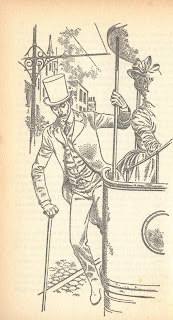 SERAGLIO, PLOT AND COMMENTARY, by Núria Lecina
SERAGLIO, PLOT AND COMMENTARY, by Núria Lecina
This short story tells
us about the relationship of a couple. We don’t know their names. Maybe the storyteller, who is the husband, doesn’t
think it is necessary. He explains the facts and his thoughts. Neither, we never know his wife’s feelings in
this experience. They are on holidays in
Istanbul, but they could be anywhere, their relationship would be the same.
They decided to
travel to Istanbul, a place really beautiful and interesting, because they
wanted something exotic, they needed holidays, but different. “A place where you can save your ordinary
life”. They look for an escape. They feel that have suffered, and now they
are in convalescence, so that’s why they want an exotic and special place. But
this way they won’t solve their problems. Sooner or later, they’ll return.
Thanks to the husband’s
narration, who has a tourist’s book, we know a lot of aspects about the exotic
Istanbul. For instance, what is the Seraglio, the place where the Sultan had
all his women or concubines.
He also defines what
is his wife like, both physically and psychologically. And what is the couple’s life like.
It is a rich text
in descriptions, full of adjectives that help the reader to understand and
imagine the situation.
One day in these
holidays, when the husband arrives to the hotel after he has done a
photographic report, he finds his wife laying on the bed crying. She explains to
him that a hotel’s worker has come to their room to repair the heater, and when
he had finished, he approached her and touched her. The explanations aren’t much
clearer, neither what they can do to clear up the incident. At this moment, the
situation becomes tense. Is she the victim? Is he guilty because he wasn’t
there? Is it necessary to inform against? What is the meaning of “touched her”? Did she use this fact to blame him? Is he
being insensitive? …
This fact makes
the husband think about how they can have arrived to this way of living, and then
he tells us about their past. Their wedding was seven years ago. They worked
together. He immediately fell in love with her. Soon they got married.
He, practising an
odd philosophy, tested his love. He had a lover to check that really the woman
who loved was his wife. This adventure, like a secret Seraglio, finished when
the wife was pregnant. But soon after, she had a miscarriage, and it all got
ruined. Perhaps his cheating on her was also an addition to their crisis?
Between them, it
was installed the silence, a common guilt, the incapacity to talk about the
loss, the incapacity to talk about the causes of everything and about what they
could do to get out of their mourning.
And so, the solution was the escape, covering up what hurt them, the
loss.
From that moment,
rewards are the most important thing: theatre, restaurants, concerts,
exhibitions, and expensive holidays.
I think the last
sentence sums it up well: “So, one doesn’t have to cross to the other
continent, doesn’t have to know what really happened”.
Until when?
QUESTIONS
-What do you know about the history of Istanbul?
-A cruel custom is mentioned. Do you know about
similar customs related to power?
-Beauty is sometimes terrible: that is what we call
sublime. Do you know any examples of this?
-What do you think of the famous cliché “Men seem to
have the power, but who really gives orders is his wife”?
-What do you know about Oman II?
-“On holiday, you want to be spared ordinary life”.
What do you think of the tourists lying on the beach, while shipwrecked
immigrant people that have come out of a small boat lay on the beach?
-Do you think clichés in the story about Turkey are
close to reality? Have you seen “Midnight Express” or “The Turkish Lover”?
-What do you know about Florence Nightingale?
-Where is Surrey in England? Do you know anything
about it?
-How fond of taking photos are you? How do you like
taking them?
-Do you think something really happened between the
porter and the wife? How do you know?
-According to your opinion, are police officers competent
enough to attend assaulted women?
-“But I have wanted this too.” What does it mean? Page
4, line 11.
-Was he really in love with his wife? How do you know?
-What do you think of the saying “Out of sight, out of
mind”?
-Can you comment the sentence “Men want power over
women in order to be able to let women take this power from them”?
-Do you usually discuss a film / play after seeing it
with your friends / partner?
-Who killed their baby? Did he have a reason to feel
guilty, and thus cause the miscarriage? What reason could be?
-What is the best way to narrate an embarrassing /
delicate situation?
-What do you think is the meaning of her holding “one
hand, closed, to her throat”?
-Having in mind their circumstances (abroad, tourists,
eastern country…), what would you have done in her situation, talk to the
manager, go to the police, go to your embassy…?
-Why did the author mention that the radiator was
“distinctly warmer”?
-Why in the plane “other people glanced at his wife”?
-Do you think their marriage will go on?
VOCABULARY
sherbet, rent, squalls,
hailstorms, bloated, spattered, Elastoplast, cripples, chequers, bled, dig, flawless,
complexion, fastidious, tends, interfered, elicit, bluffly, blowing up, sensible,
cut out, consultant designer, crushed, make believe, conscripted, heater, siege,
scornful, issue, scoff, linen, gauge, ledge, reprieve, stay of execution, plane
trees






